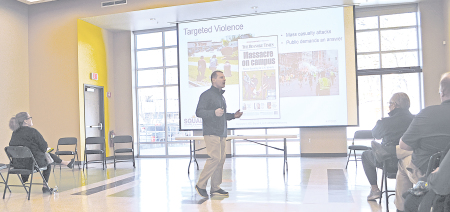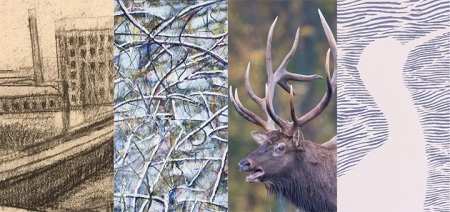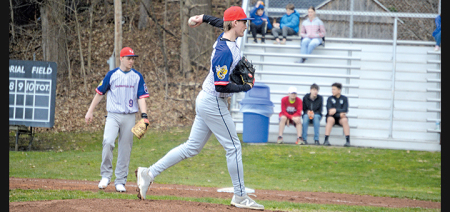Tilting At Windmills – Picture This: Encore
Published:
November 25th, 2022
By:
Shelly Reuben
 Fiction author Shelly Reuben
Fiction author Shelly Reuben
The sentiments I expressed years ago in this column are just as relevant today. So, please, put your digital camera back into its camera bag, turn off your computer Photo-Share, and clear your mind.
Thank you.
Now, think back to your childhood. To, perhaps, your grandmother’s house at Thanksgiving. Your father and uncles are in the television room watching men smash their heads together over a pigskin ball. Your mother and sisters are in the kitchen, hovering over dessert. By having cleverly implemented your new powers of invisibility, you have escaped both encampments and are huddled in the corner of the living room beside the built-in bookshelves where your grandparents keep their memorabilia.
You are holding a photo album in your hands. The thick black pages have a musky aroma of old books, and at the corner of each picture is a tiny black triangle affixing it to the page. Some of the pictures are sepia. Some black and white. Some are surrounded by narrow white borders. Some are wallet sized. Some are huge. There is no standard size, shape, or shade. Yet all instantly evoke a place and time. Chicago: The Wrigley Building. Brooklyn: The Boardwalk. Norwich: Town Square. The locations are identifiable, yet … different. A lion still guards the entrance to the Art Institute, and the view of Manhattan from Brooklyn Heights is unmistakable. But … who is that girl with her arm round the bronze lion’s mane? Who is the man leaning against the railing overlooking the harbor, and why does he have such a cocky expression on his face?
Places — instantly recognizable. People. Vaguely familiar. Odd clothes. Bizarre hairstyles. Warm smiles. Alluring. Off-putting. Interesting. But always ... always conveying a compelling tug of intimacy.
You sit cross-legged on the carpet with the album splayed on your lap. You hear a soft scuffle of footsteps, look up and see your grandmother (or aunt, or mother) chuckling. It is a low, affectionate sound. She kneels beside you, drops her finger to a sepia picture in the middle of the page, and says, “Do you know who that is?”
A dashing young man grins up at you. He is wearing a wide, diagonal striped tie and he has what you have always thought of as a Humphrey Bogart hat tilted rakishly on his head. There is a cigarette dangling, gangster-like, from his lips. He is fabulous. As handsome as George Raft before he machine-guns five bootleggers in an old movie.
That,” your grandmother says with warm pride, “is your great grandfather.”
You stare down at the page, but before you can absorb this information, her finger has moved on to another photograph, and another, and another: A stunning young woman poised on the crest of a snow-covered hill. A different woman, serene and lovely, with a huge corsage pinned to the lapel of her suit. A dashing young man in uniform mounting the steps of a train. Two cute little girls tucked into the arms of a soldier staring grimly into the camera. Those same two girls, years later, posing in party dresses in front of a fireplace. A boy with beautiful eyes on a motorcycle.
These people, your grandmother explains, are your great grandmother, skiing. Your grandmother, the very lady kneeling at your side, on her wedding day. And your great uncle on his way to war. The two little girls are your mother and aunt; the man hugging them is your uncle, back from war and emotionally devastated by his time in a prison camp. The girls in prom gowns are your mother and aunt, all grown up. The boy on the motorcycle? Your grandmother pauses. When she continues, her voice is momentarily sad as she tells you that this is the uncle you never met — a fine young musician who died in a boating accident.
Your aunt calls out from the kitchen. Your grandmother disappears. You flip through more pages. You see slim, happy people in swimsuits; a man leaning against a split rail fence; four women, their arms around each other, doing high kicks. You continue to peruse the pages, your heart snug and your mind at ease because you know that your grandmother (or uncle, or mother) will give these people names, and that the stories she tells will connect you with the joys, sorrows, and soul of your family’s past.
Now, put the album away.
Clear your mind. Take out your digital camera, turn on your Photo-Share, and think forward. You are a grandparent and it is still Thanksgiving. The rituals are the same, the smells are every bit as delicious, the uncles and fathers are watching a game on whatever constitutes television in the far off future, and the aunts and wives are clucking in the kitchen. As before, one of the grandchildren has escaped. When you see him from the doorway, he is poking through a jumble of objects in a cabinet. You cross the room and kneel beside him just as dozens of plastic cases and flat, square objects clatter to the floor.
He points to a pile of circular silver disks. You can barely make out the occasional word scrawled with a magic marker across the label: “Graduation.” “Trip to Niagara.” “Little League.” Most, however, are unnamed. Your grandchild asks, “What are they?”
And so, you explain about floppy disks and hard drives and thumb drives and CDs and DVDs and machines that were replaced long ago by new technology, and photographs that were transmitted via Internet and saved in the computer’s memory. You tell this wonderful, inquisitive child that the disk in his hand contains pictures of his grandparents and parents, their weddings, their children, their school plays, their triumphs, joys, and follies.
The boy lets the CD drop. It clangs bitterly to the floor. “But where are the pictures?” He demands.
You hesitate, blush guiltily, and admit, “We never printed them out.”
“Why not?” He again demands.
“Because we thought the machines would always be here. We believed that we would always be able to print them out if we needed them ... someday.”
The boy stares at you a moment longer. Then, without a word, he gathers up the useless output of dead technology and returns it to the cabinet. He stands, brushes off his pants, and joins the men in the den watching football. No stories have been conveyed. No memories have been preserved. No soul or spirit of the past has been transmitted.
The holiday season is upon us. Families gather. Joy and laughter are waiting in the wings.
Be warned.
Be vigilant.
Preserve the present. Print your photographs. Someday, they will be your child’s only avenue to the past.
Copyright © Shelly Reuben, 2022. Shelly Reuben’s books have been nominated for Edgar, Prometheus, and Falcon awards. For more about her writing, visit www.shellyreuben.com
Author: Shelly Reuben - More From This Author
Comments








